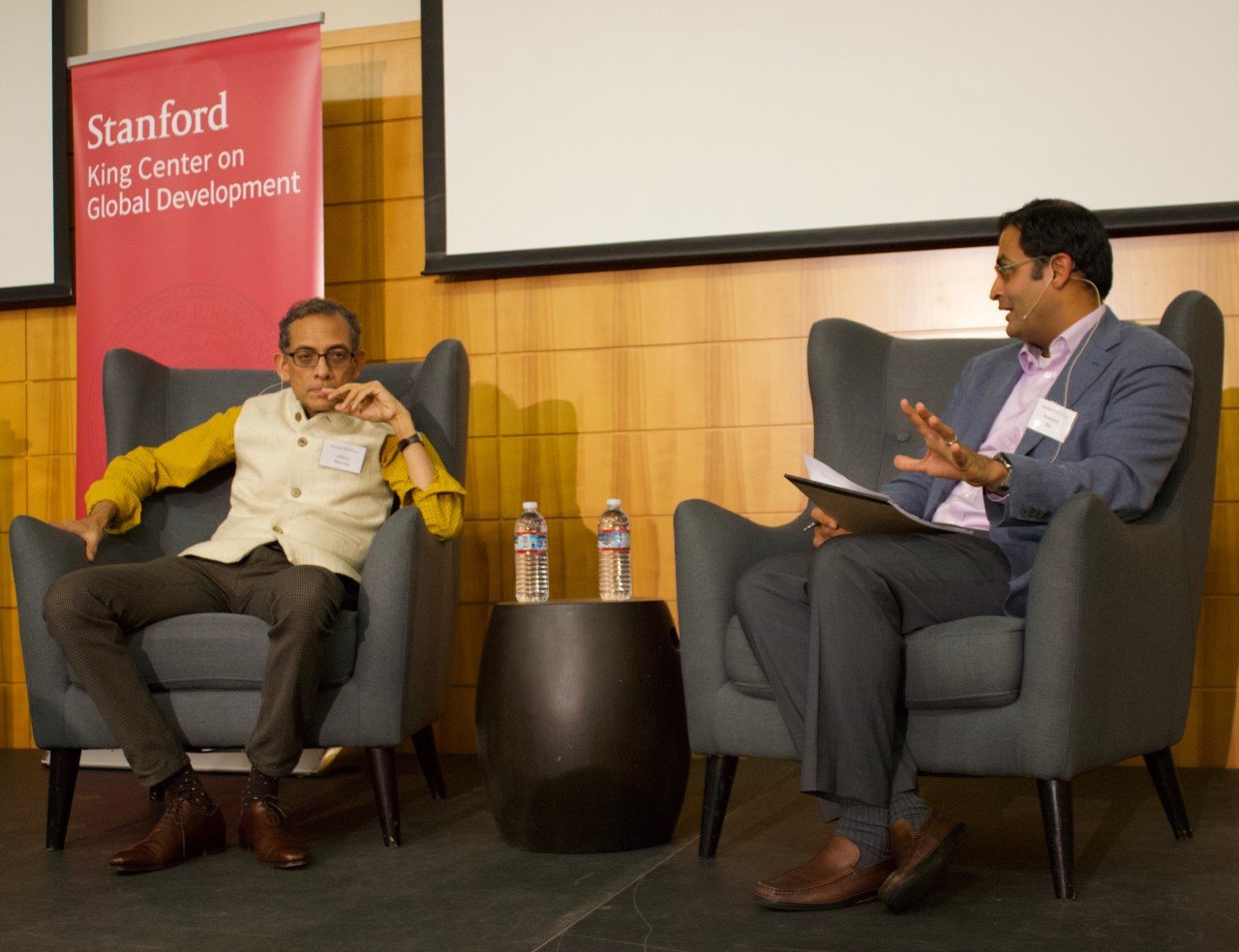“Put dignity back at the center of social protection,” said Abhijit Banerjee in a talk on his book “Good Economics for Hard Times” on Dec. 3. Banerjee is the Ford Foundation International Professor of Economics at MIT and co-recipient of the 2019 Nobel Memorial Prize in Economic Sciences along with Esther Duflo, his wife, and Michael Kremer. Saumitra Jha, associate professor of political economy at the Stanford Graduate School of Business, moderated the discussion.
Against a backdrop of Brexit and societal polarization, with extended battles over climate change, immigration and trade, Banerjee said his purpose in writing the book was to “hold on to hope” and “to emphasize that there are no iron laws of economics keeping us from building a more humane world.”
Banerjee began the event by describing the public distrust in economists in the United States, citing a poll showing only 25% of Americans trust the claims of economists. He pointed to this skepticism as a source of some of the disagreements with the public, as well as difficulties implementing recent policies advocated by economists.
Banerjee pointed to several causes for the current lack of trust in economists, arguing that they often behave as “oracles” and make predictions without giving an explanation for their claims that resonates with the public. Economists are also criticized for making incorrect predictions, such as about the timing of recessions. Banerjee maintained that economists “[are] the best in the business” at predicting economic outcomes, but that these outcomes are an “impossible target.” Given the difficulty of their task, Banerjee said “we [economists] often overestimate what we can do and that gives us a bad name.”
Banerjee also addressed immigration, describing it as a key area in which public opinion vastly differs from that of economists.
“People believe more in one version of economics than economists do,” he said. “There’s a supply curve and demand curve, immigration means more supply, therefore the prices will go down.”
On the other hand, the majority of economists argue that immigrants also drive more demand in the places they move to, tending to offset the increase in supply that they add, according to Banerjee.
Banerjee also dismissed the popular narrative that “as soon as you open the borders, everyone is going to keep rushing in; therefore, we need the wall.” Instead, he said, “most people actually migrate when they’re pushed out.” He attributed the recent rise in Mexican and Guatemalan immigration, for instance, more to drug violence than to possible financial gains from coming to America.
Banerjee also discussed trade, which he said shifts economic growth and has significant consequences for some people, with small positive gains for everyone else.
“People are not asking what is the average effect on GDP, they’re asking the question, ‘Is this creating more misery than it’s worth?’” he said. “And those questions might have very different answers. If we compensated people [who are hurt by trade], we’d be better off, but we don’t actually compensate people.”
Banerjee also focused on the intersection of economics and societal prejudice. He argued that forms of intolerance can be linked to economic loss.
“Racism is not a given fact about people, nor is misogyny nor is any of the other forms of prejudice,” Banerjee said. “These are all outcomes of various other forces.”
Those forces, he argued, can be largely linked to economic losses. To combat these forces and restore “dignity” to those feeling that trade has taken “their sense of life away from them,” he called for economic action.
“We need to think about how to compensate people for their [losses]” from trade, Banerjee said.
As part of the solution, he said, increased taxes are needed to fund programs that would offset the pains of trade disproportionately affecting a small number of the population. This would allow for the net benefit of trade to be gained overall without leaving so many behind.
“I know ‘taxes’ in the U.S. is a dirty word but … taxes have to go up,” he said.
Banerjee also said funds generated from a carbon tax should be funneled back to the communities most hurt by those policies rather than used for general government funding.
The talk concluded with a call for economists to consider policies on a more human level.
“You have to … [think] about what it means to have a life rather than some money or being able to afford food stamps,” Banerjee said. “[It’s important to think] about what it means for people to lose their entire life, their sense of who they are, the jobs that they had for 20 years — what it means for them, and therefore what it would take to put it back.“
Joel Reinecke ’20 related to Banerjee’s discussion of the mistrust in economists.
“There have definitely been many times where I’ve questioned going into economics because of the issues that he raised, where specifically with the issue of forecasting where the economists are always making statements which they are not necessarily justified in making,” Rienecke said. “But I’ve kind of come to a point now where out of all the social sciences, in my opinion, economics does the best at attempting to be as rigorous as possible by using quantitative tools.”
Earth systems science assistant professor Marshall Burke had a different perspective on public trust in economists.
“For better or worse, economists still have a huge voice in policy discussions and I think are listened to much more than academics from other walks of life,” he said, pointing to their communication with the media and policymakers.
Contact Riley DeHaan at rdehaan ‘at’ stanford.edu.
